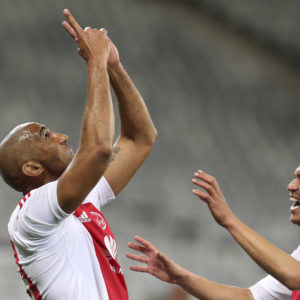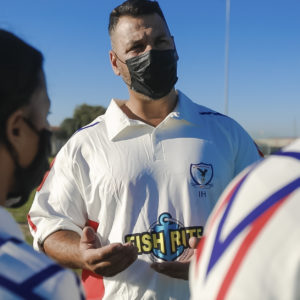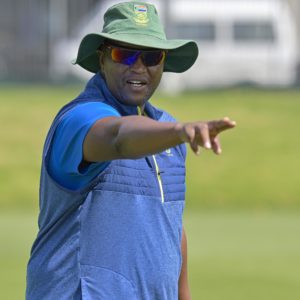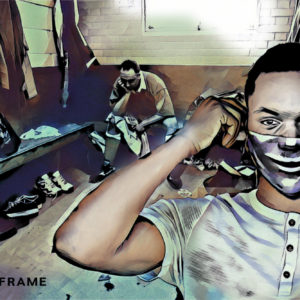Sinalo Jafta is doing what they said she couldn’t
The Proteas wicketkeeper is not only living her dream with the national cricket team, but she’s also speaking out about mental health and getting her foundation off the ground.
Author:
29 November 2021
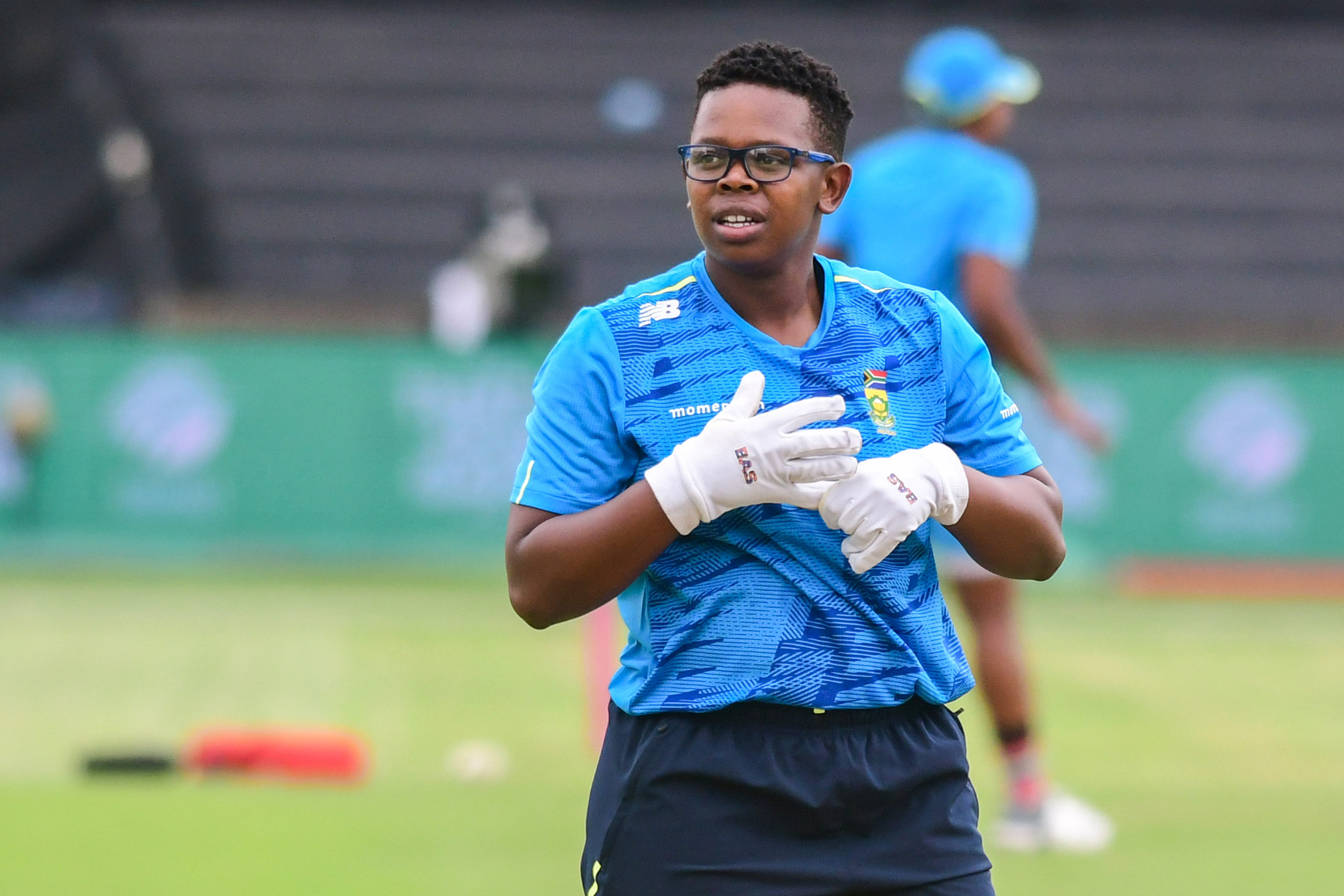
There’s probably no better way to motivate Sinalo Jafta, 26, than to tell her she cannot do something. She was told that a lot, growing up as a young girl and an aspiring cricketer.
Now, the wicketkeeper’s natural aversion to being treated any way but equally is the motivation fuelling her burgeoning international career. “In primary school, there was never any girl’s cricket. We played with the boys. Then one day I got hit with a bat and one of the teachers said, ‘Ja, girls will never play cricket.’”
Jafta took a deep breath, said nothing and channelled her anger into proving him wrong. And not only may those harsh words have inspired a vibrant international career, but her work with the Menstruation Foundation, a non-governmental organisation that provides menstrual products, affects millions of girls around the country.
Related article:
“When I signed with my agent, the first thing I said to him was I want to start a foundation. He simply said okay. We’ve donated over 400 000 pads in five months. That’s something people didn’t have. We’re trying to branch out into the Eastern Cape. I love that they’re incorporating sport in it, where I can give back and help the cricket and hockey players.”
Jafta turned down a national hockey call-up to play international cricket. “At varsity, I was on a full bursary for hockey and I said to my cricket coach, thank you for the opportunity, but I’m done. My coach refused to accept that. He would come to the astro every day and say, ‘Come play, come play.’”
Jafta eventually relented and it set her on the path to a national contract from Cricket South Africa (CSA) ahead of the 2020-2021 season. She had it coming. Having made her international debut in 2016, Jafta was selected for the 2019 Twenty20 squad to play Pakistan, making her T20 debut in May that year. She was also included in the Devnarain XI, subsequently called the Coronations, to compete in the domestic Women’s T20 Super League.
A dream come true
“In 2016, just after I made my cricket debut in October against New Zealand, I got my first call-up to the national hockey team, and the next year was the Commonwealth Games. The year after that was World Cup cricket,” says Jafta.
It was a childhood dream come true for Jafta to wear the national colours, but not many athletes excel at this level in two sports. Right or wrong, a decision needed to be made.
“I was supposed to go to Clarendon High School for Girls [in East London], but I said to my mom, let’s look for a high school that has cricket for girls. So then we came across Stirling High School. They were okay, but at least they had girls’ cricket, and their hockey was very good. So I thought okay, first priority is hockey.
Related article:
“I went to [cricket] trials for Border in grade 8. I was bad. I didn’t have the right coaching. I didn’t understand what I was doing. In hockey, it’s just see ball, hit ball. Then in grade 9 I said to myself, I’m going to go for it. I made the Border cricket team but I was benched, yet in hockey I was making SA schools.”
The next season she was asked to take over as wicketkeeper. Seeing herself as an allrounder, it was a move she accepted reluctantly. “I bowl and I bat. I hated being behind the stumps. I felt like I could get hit,” she says.
Border’s Angelique Taai, who played eight one-day internationals (ODIs) and two T20 internationals for South Africa, took Jafta under her wing. “She helped me a lot. It took her probably three months to crack me in the gloves. I said to myself if this is my way into the team, I’ll take it. In grade 11, I started picking it up and then in my matric year, I was made the SA Under-19 captain.”
Team players
Since making her national debut, Jafta has seen up close the sacrifices the team have made in their run-up to the 2022 Women’s Cricket World Cup in New Zealand. She says their success has been built on the ideology of the team over individuals, with every player accounting for their role in the side.
“I’m a wicketkeeper, I have to keep well. You’re a bowler, you have to bowl well. The batters have to bat well, and somewhere we have to let things click between the three disciplines. Once all three click, the team is moving beyond their years, and that’s my belief. Yes, you can say individuals won the game. But on the trophy, it doesn’t say which individual won the World Cup. It’s the team name engraved on there, you can’t do it alone.”
It’s a philosophy that has served the team well as they grow stronger each season under the stewardship of crafty coach Hilton Moreeng. They’ve been in irresistible form of late, winning three series in succession – against Pakistan, India and the West Indies – and climbing up the ODI rankings to third, above India.
Related article:
Equality, or the team’s fight for it, has been a hallmark of the rise of the Proteas. Their success has been built largely around a core of established world-class players such as Mignon du Preez, Marizanne Kapp, Dané van Niekerk, Shabnim Ismail, Lizelle Lee, Trisha Chetty, Suné Luus and Laura Wolvaardt, who between them have more than 2 000 white-ball internationals. This is the dream team in South African cricket right now.
Jafta agrees, and she’s had a taste of the secret sauce. “Belief. That’s the one thing. I would speak to Shibs [Ismail] and she would encourage me. It’s also about honesty with who you are. I know I’m the best and if I believe I’m the best, then I will play like I’m the best. We’ve worked behind closed doors and the results show … We are the best team, and that’s how I approach it. If I don’t think we’re the best, then what am I doing in the team?”
The Momentum Proteas, as they’re officially called, have been on a path to world domination for much of the past decade. Even as juggernauts Australia and England ruled, South Africa found ways when it mattered, reaching two consecutive World Cup semifinals – first in the ODI format in 2017 and then in a courageous run at the T20 World Cup last year.
Struggles along the way
Today’s victories may well be inspiring tomorrow’s champions. More attention, time and resources are strengthening the women’s game, including structures such as the Women’s T20 Super League and the recently completed CSA Women’s Provincial One-Day Tournament.
Moreeng has also been blazing a trail in coaching terms since his appointment in 2012, working tirelessly to build the team. He will be credited with producing a golden generation of cricketers and Jafta couldn’t have asked for a better coach, a former wicketkeeper himself.
“Coach Hilton should have dropped me a long time ago. In 2018, when I didn’t want to train, he called me and I cut the call. I blamed him for me being dropped. He said to me, ‘I want you to get experience.’ I was a kid. The relationship really deteriorated. He’s very smart and helped me so much with my game.”
Jafta has been vocal about her struggles as a professional athlete, but for her cricket is a release. “The only thing that can bring me back from my depression and mental health issues is cricket … At the beginning of my career, I was open enough to say I’m struggling, and say it’s not my skills, mentally I’m just messed up. I went into the biggest slump I’ve ever had. I didn’t touch a cricket bat or train for eight months. I coached hockey … But the coach got me a psychologist, Adrian McInman from New Zealand. If I saw Adrian a week later, I would have quit cricket. That’s how bad it was.
Related article:
“What I’m working on now is just being honest and transparent … You might be the fittest person, but if you look at yourself in the mirror, you see someone different. I smile, but what is exactly behind my smile? Only a few people can tell. If you put me in front of a camera, I’m fine.”
One of those few people is Jafta’s mother, Lumka Jafta, who is a curriculum adviser for the Department of Basic Education, having worked as a teacher for 20 years.
“Who else can say I played SA cricket, I played SA hockey, and was raised by a single mother who wasn’t afraid to pay thousands for me to go to boarding school from grade 2, because she wanted me to play cricket and get a good education. I’m really proud of her,” says Jafta.
“We always celebrate the victories, but never look at the struggles. I look at the struggles first. My struggle was being raised by a single parent. We didn’t have money and we just made the best of what we had.”

